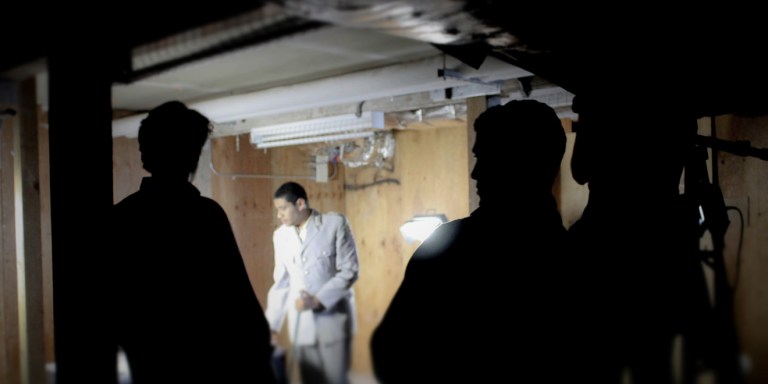The first official student work produced under the newly introduced Cardinal Studios banner, “Prisoner,” a short film directed by Becky Aydin (’18) and written by Alexander Kucy (’17), is both an immense victory for the campus film community and a bit of a disappointing first feature for Stanford’s only student-run production company. Searching for a profoundly impactful message, “Prisoner” sacrifices plot development and facile comprehension in the pursuit of deeper meaning, paradoxically drowning its intent beneath quick paced verbal sparring and allegorically dense dialogue. Regardless, the many collaborators behind this tremendous undertaking deserve praise for even daring to embark on such a risky venture, breaking ground for what will hopefully be a new wave of collectively conceived student projects — as yet unheard of, on the university’s production-insubstantial campus.
“Prisoner” begins as an unnamed detainee (Daniel Johnson ’16) lies upon the cement floor of what would appear to be a holding cell. As he basks in the darkness of his nightmarish prison, he is accosted by a fast-talking authority figure (Carlos Valladares ’18) — also unnamed, who immediately draws a firm line between guard and convict, oppressor and oppressed. This watchman, dressed in garb that comes across as more militaristic than administrative (think: Castro), then proceeds to expatiate on the extensive and insurmountable contrasts between the two men, only separated on-screen by a thin chalk boundary. Goading the detainee with a wicked snarl and a series of increasingly cruel schemes, the guard then drives the detainee to his breaking point, provoking unforeseen consequences for both parties.
For the limited resources made accessible to the fledgling Cardinal Studios, “Prisoner” is actually quite technically sound. Forced to shoot over the course of a single weekend, “Prisoner” rarely bares the markings of cinematic amateurism. The sound design, which is often the greatest defect in student films like “Prisoner,” is actually consistently crisp, though often lost amid the persistent hum of Freddy Avis’s (’16) excellent but overused musical score. The photography, directed by Raquel Shrestha (’17) is also quite professional, managing to make the film’s unified — and admittedly featureless — locale feel engaging and compelling throughout. “Prisoner” would probably benefit from more close-ups and cutaways, yet, nevertheless, Shrestha’s cinematography both consistently carries the film’s central conflict and effectively clarifies the film’s otherwise murky narrative progression.
The cast of “Prisoner” is similarly enjoyable, reciting fairly difficult lines with practiced ease. Among the pair, Valladares is the clear standout, chewing scenery, like a more deliberate Christoph Waltz. Imbuing his utterances with cheeky malevolence, Valladares makes it difficult to get too caught up in the intricacies of the script’s many grating platitudes. Occasionally Valladares falters — unsure whether his guard is a deranged lunatic or a simple authoritarian with a penchant for sadism — though these minor breaks are sporadic enough that they do not detract from the overall success of the film. Regrettably, Johnson, as the guard’s enfeebled charge, is regularly outshined by more the extroverted Valladares, especially in exchanges driven by dialogue. When Johnson is left to communicate through gesture and expression, however, there is a subtlety and nuance to his performance that grounds “Prisoner” in reality, bringing emotional heft to the film’s fairly stiff narrative.
Unfortunately, despite its fundamental achievements, “Prisoner” remains largely incomprehensible. With dialogue delivered in extensive speeches rooted in metaphor, watching “Prisoner” is often like watching a dog chase its tail. Many times it seems as if the film’s characters are going nowhere, saying the same things over and over again, all the while becoming inexplicably more aggressive as demanded by the plot. Words fly like bullets, but more often that not, they land with a thud, failing to register and leaving no lasting impression. The script is not necessarily bad — Kucy is clearly well versed in the art of manufacturing tension — it’s just that, in the film’s desire to act as some sort of veiled commentary on power dynamics, “Prisoner” winds up feeling like an introductory poli-sci lecture viewed at 4x the regular speed.
With that being said, there’s an incredible amount of potential lurking beneath Cardinal Studio’s expectedly clunky first production, and future outings of the film’s talented cast and crew could easily prove fruitful.
“Prisoner” will screen at 8 p.m. at the Roble Theater on May 20, at Haus Mitt on May 21, and Kimball Hall on May 22. There will also be a screening of the film on May 23 at 7 p.m. in Florence Moore Hall. Each screening will be followed by a question and answer session with the film’s cast and crew.
Contact Will Ferrer at wferrer ‘at’ stanford.edu
